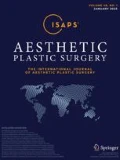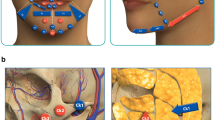Abstract
Background
Plastic surgeons are called upon to perform aesthetic surgery on patients of every gender, race, lifestyle, and religion. Currently, it may seem natural that cosmetic surgery should be perceived as permissible, and in our modern liberal age, it seems strange to attempt justifying certain surgical acts in the light of a particular cultural or religious tradition. Yet every day, cruel realities demonstrate that although the foremost intention of any scripture or tradition has been mainly to promote religious and moral values, most religions, including Christianity, Islam, and Judaism, invariably affect human behavior and attitude deeply, dictating some rigid positions regarding critical health issues.
Methods
A Web search was conducted, and the literature was reviewed using the Medline search tool.
Results
Islamic law closely regulates and governs the life of every Muslim. Bioethical deliberation is inseparable from the religion itself, which emphasizes continuities between body and mind, between material and spiritual realms, and between ethics and jurisprudence.
Conclusions
The rule in Islam is that individuals should be satisfied with the way Allah has created them. Islam welcomes, however, the practice of plastic surgery as long as it is done for the benefit of patients. Even if it clearly considers “changing the creation of Allah” as unlawful, Islamic law is ambiguous regarding cosmetic surgery. Its objection to cosmetic surgery is not absolute. It is rather an objection to exaggeration and extremism. It has been mentioned that “Allah is beautiful and loves beauty.”
Similar content being viewed by others
References
Rassool GH (2000) The crescent and Islam: Healing, nursing, and the spiritual dimension: Some considerations towards an understanding of the Islamic perspectives on caring. J Adv Nurs 32:1476
Wright S (1999) How to be happy at work. Nurs Times 95:26
Lee BY, Newberg AB (2005) Religion and health: A review and critical analysis. Zygon 40:443
Aksoy S, Elmai A (2002) The core concepts of the “four principles” of bioethics as found in Islamic tradition. Med Law 21:211
Betancourt JR, Green AR, Carillo JE (2003) Defining cultural competence: A practical framework for addressing racial/ethnic disparities in health and healthcare. Public Health Rep 118:293
Rispler-Chaim V (1989) Islamic medical ethics in the 20th century. J Med Ethics 15:203
Ypinazar VA, Margolis SA (2006) Delivering culturally sensitive care: The perceptions of older Arabian Gulf Arabs concerning religion, health, and disease. Qual Health Res 16:773
Daly J, Davidson P, Chang E, et al. (2002) Cultural aspects of adjustment to coronary heart disease in Chinese-Australians: A review of the literature. J Adv Nurs 39:391
Maher P (1999) A review of “traditional” aboriginal health beliefs. Aust J Rural Health 7:229
Westreich M (1998) Orthodox Jewish law (Halachah) and plastic surgery. Plast Reconstr Surg 102:908
Carey JS (1989) Cosmetic surgery: A theological comment. Plast Reconstr Surg 83:139
Quest TE, Franks NM (2006) Vulnerable populations: Cultural and spiritual direction. Emerg Med Clin North Am 24:687
Gesler W, Arcury TA, Koenig HG (2000) An introduction to three studies of rural elderly people: Effects of religion to culture on health. J Cross-Cultural Gerontol 15:1
Agha Al-Hayani F (2007) Biomedical ethics: Muslim perspectives on genetic modification. Zygon 42:153
Hammoud MM, White CB, Fetters MD (2005) Opening cultural doors: Providing culturally sensitive health care to Arab American and American Muslim patients. Am J Obstet Gynecol 193:1307
Daar AS, Al Khitamy B (2001) Bioethics for clinicians: Islamic bioethics. Can Med Assoc J 164:60
Hathout H (1995) Why an Islamic perspective? In: El-Gindy AR (ed) Health policy, ethics, and human values: Islamic perspective. Islamic Organization of Medical Sciences: Kuwait, pp. 81–85
Tripod. On the Islamic schools of law. Retrieved May 2, 2007 at http://www.members.tripod.com/∼SuzyAshraf/index.html_essays
Ahlul Bayt Digital Islamic Library Project. The five schools of Islamic thought. Retrieved May 2, 2007 at http://www.al-islam.org/shiism/3.htm
Wikipedia. Divisions of Islam. Retrieved May 2, 2007 at http://www.en.wikipedia.org/wiki/Divisions_of_Islam
Islamic Research Foundation. Which school of thought should a Muslim follow? Retrieved May 2, 2007 at http://www.irf.net/irf/dtp/dawah_tech/ques13.htm
GlobalSecurity.org. Twelvers/Ithna Ashari Islamic schools of thought. Retrieved May 2, 2007 at http://www.globalsecurity.org/military/intro/islam-ithna-ashari2.htm
Lawrence P, Rozmus C (2001) Culturally sensitive care of the Muslim patient. J Transcultural Nurs 12:228
Ahmadiyya Muslim Community. Islamic schools of thought. Retrieved May 2, 2007 at http://www.alislam.org/library/books/revelation/part_1_section_3.html
Conrad LI (1994) Islamic medical ethics in the twentieth century. Med Hist 38:353
Gatrad AR, Sheikh A (2001) Medical ethics and Islam: Principles and practice. Arch Dis Child 84:72
Galanti GA (2001) Caring for Muslim Patients. BMJ 322:242
McAuley J, Pecchioni L, Grant J (2000) Personal accounts of the role of God in health and illness among older rural African American and White residents. J Cross-Cultural Gerontol 15:13
Levin JS (1996) How religion influences morbidity and health: Reflections on natural history, salutogenesis, and host resistance. Soc Sci Med 43:849
Aksoy S, Elmai A (2002) The core concepts of the “four principles” of bioethics as found in Islamic tradition. Med Law 21:211
Ali N (1996) Providing culturally sensitive care to Egyptians with cancer. Cancer Pract 212
Al Khayat MH (1995) Health and Islamic behaviour. In: El Gindy AR (ed) Health policy, ethics, and human values: Islamic perspective. Islamic Organization of Medical Sciences: Kuwait, pp. 447–450
Abrahamic faith. Predestination in Islam. Retrieved May 2, 2007 at http://www.abrahamic-faith.com/shamoun/Predestination%20in%20Islam.html
Mohamed I (2000) Concept of predestination in Islam and Christianity: Special reference to Averroes and Aquinas. Islamic Q 44:393
New English Review. Predestination and free will. Bynum R. Islam (2006 November). Retrieved May 3, 2007 at http://www.newenglishreview.org/custpage.cfm?frm=4557&sec_id=4557
Zahr L, Hattar-Pollara M (1998) Nursing care of Arab children: Consideration of cultural factors. J Pediatr Nurs 13:349
Answering Islam. In: Emory VanGerpen (ed) Notes on Islam. Retrieved May 3, 2007 at http://www.answering-islam.org/Index/P/predestination.html
Dartmouth. In: Yusuf al-Qaradawi (ed) The lawful and prohibited in Islam. Retrieved May 6, 2007 at http://www.dartmouth.edu/∼dcare/pdfs/yusuf.pdf
Islam awareness. In: Mohamed El-Moctar El-Shinqiti (ed) Fatwa: Alcohol-based medication. Retrieved May 3, 2007 at http://www.islamawareness.net/Alcohol/fatwa_alcohol002.html
Islam Online. Retrieved May 6, 2007 at http://www.islamonline.net/servlet/Satellite?cid=1119503543948&pagename=IslamOnline-English-Ask_Scholar%2FFatwaE%2FFatwaEAskTheScholar
Gezairy HA: Islam unclean substances in medicines. Retrieved May 3, 2007 at http://www.ganfyd.org/index.php?title=Islam_unclean_substances_in_medicines
Aksoy S, Elmai A (2002) The core concepts of the “four principles” of bioethics as found in Islamic tradition. Med Law 21:211
Rahman F (1979) Legacy and prospects. In: Islam. 2nd ed. University of Chicago Press: Chicago, pp. 235–254
Ilkilic I (2002) Bioethical conflicts between Muslim patients and German physicians and the principles of biomedical ethics. Med Law 21:243
Gatrad AR, Sheikh A (2001) Medical ethics and Islam: Principles and practice. Arch Dis Child 84:72
Paladin AV (1998) Ethics and neurology in the Islamic world: Continuity and change. Ital J Neurol Sci 19:255
Pellegrino Edmund D (1987) Toward a reconstruction of medical morality. J Med Humanit Bioeth 8:7
Islamic Organization for Medical Sciences (Islamset). Topics in Islamic medicine: On medical examination of the other sex. Retrieved May 5, 2007 at http://www.islamset.com/ethics/topics/index.html
Kleinman A, Eisenberg L, Good B (1978) Culture, illness, and care: Clinical lessons from anthropologic and cross-cultural research. Ann Intern Med 88:251
Yahoo. Plastic surgery between science and faith (Arabic). Retrieved May 2, 2007 at http://www.geocities.com/dr_mohamed_a/islam.htm
Al Jazeera Publishing. Ruling on cosmetic surgery. Retrieved May 2, 2007 at http://www.islamonline.com
ITMR. In: Al-Kawthari MIA (ed) Is cosmetic surgery allowed? Retrieved May 2, 2007 at http://www.themodernreligion.com/misc/hh/cosmetic-surgery.html
Al Jazeera Publishing. In: Dirie A (ed) The brave new era of biomedicine: Where do Muslims stand? Retrieved May 2, 2007 at http://www.islamonline.net
2007 Islamnet.com. The Islamic vision of some medical practices. Retrieved May 2, 2007 at http://www.islamnet.com
Al Ghazal S. In: Al-Awadi ARA, Al-Mazkur K, Al-Saif A, et al (ed) Is cosmetic surgery allowed? Retrieved May 2, 2007 at http://www.islamicmedicine.org
Studying Islam. In: Mobin-Uddin (ed) A head scarf is far more than a symbol for Muslim women. May 2, 2007 at http://www.studying-islam.org/articletext.aspx?id=918
For all the Muslims. In: Imaam ibn al-Qayyim al-Jawziyyah (ed) Allaah is beautiful and loves beauty. Retrieved May 5, 2007 at http://www.sunnahonline.com/ilm/purification/0005.htm
McLane S, Lox CL, Butki B, Stern L (2003) An investigation of the relation between religion and exercise motivation. Percept Motor Skills 97:1043
Monroe MH, Bynum D, Susi B, Phifer N, Schultz L, et al. (2003) Primary care physician preferences regarding spiritual behavior in medical practice. Arch Intern Med 163:2751
Armbruster CA, Chibnall JT, Legett S (2003) Pediatrician beliefs about spirituality and religion in medicine: Associations with clinical practice. Pediatrics 111:227
Levin JS, Larson DB, Puchalski CM (1997) Religion and spirituality in medicine: Research and education. J Am Med Assoc 278:792
Kleinman A, Eisenberg L, Good B (1978) Culture, illness, and care: Clinical lessons from anthropologic and cross-cultural research. Ann Intern Med 88:251
Betancourt JR, Green AR, Carillo JE (2003) Defining cultural competence: A practical framework for addressing racial/ethnic disparities in health and healthcare. Public Health Rep 118:293
DeFazio Quinn DM (2006) How religion, language, and ethnicity impact perioperative nursing care. Nurs Clin North Am 41:231
Al-Kassimi M (2003) Cultural differences: Practising medicine in an Islamic country. Clin Med 3:52
Ozgen C (2006) Ethics in the use of new medical technologies for neurosurgery: “Islamic viewpoint.” Acta Neurochir Suppl 98:13
Galanti GA (2000) American health care professionals should respect the traditions of other cultures. West J Med 173:356
Mousavi SR (2006) Ethical considerations related to organ transplantation and Islamic law. Intern J Surg 4:91
James SA (1994) Reconciling international human rights and cultural relativism: The case of female circumcision. Bioethics 8:1
Hellsten SK (2004) Rationalising circumcision: From tradition to fashion, from public health to individual freedom: Critical notes on cultural persistence of the practice of genital mutilation. J Med Ethics 30:248
Leaman O: Islamic philosophy. In: E. Craig (ed) Routledge encyclopedia of philosophy. Routledge: London, 1998. Retrieved March 30, 2007 at http://www.rep.routledge.com/article/H057
Author information
Authors and Affiliations
Corresponding author
Additional information
This review was not supported financially by any organization, pharmaceutical company, or research board. The authors also do not have any financial or other interest from conducting it.
An erratum to this article can be found online at http://dx.doi.org/10.1007/s00266-009-9398-9.
Rights and permissions
About this article
Cite this article
Atiyeh, B.S., Kadry, M., Hayek, S.N. et al. Aesthetic Surgery and Religion: Islamic Law Perspective. Aesth Plast Surg 32, 1–10 (2008). https://doi.org/10.1007/s00266-007-9040-7
Published:
Issue Date:
DOI: https://doi.org/10.1007/s00266-007-9040-7




